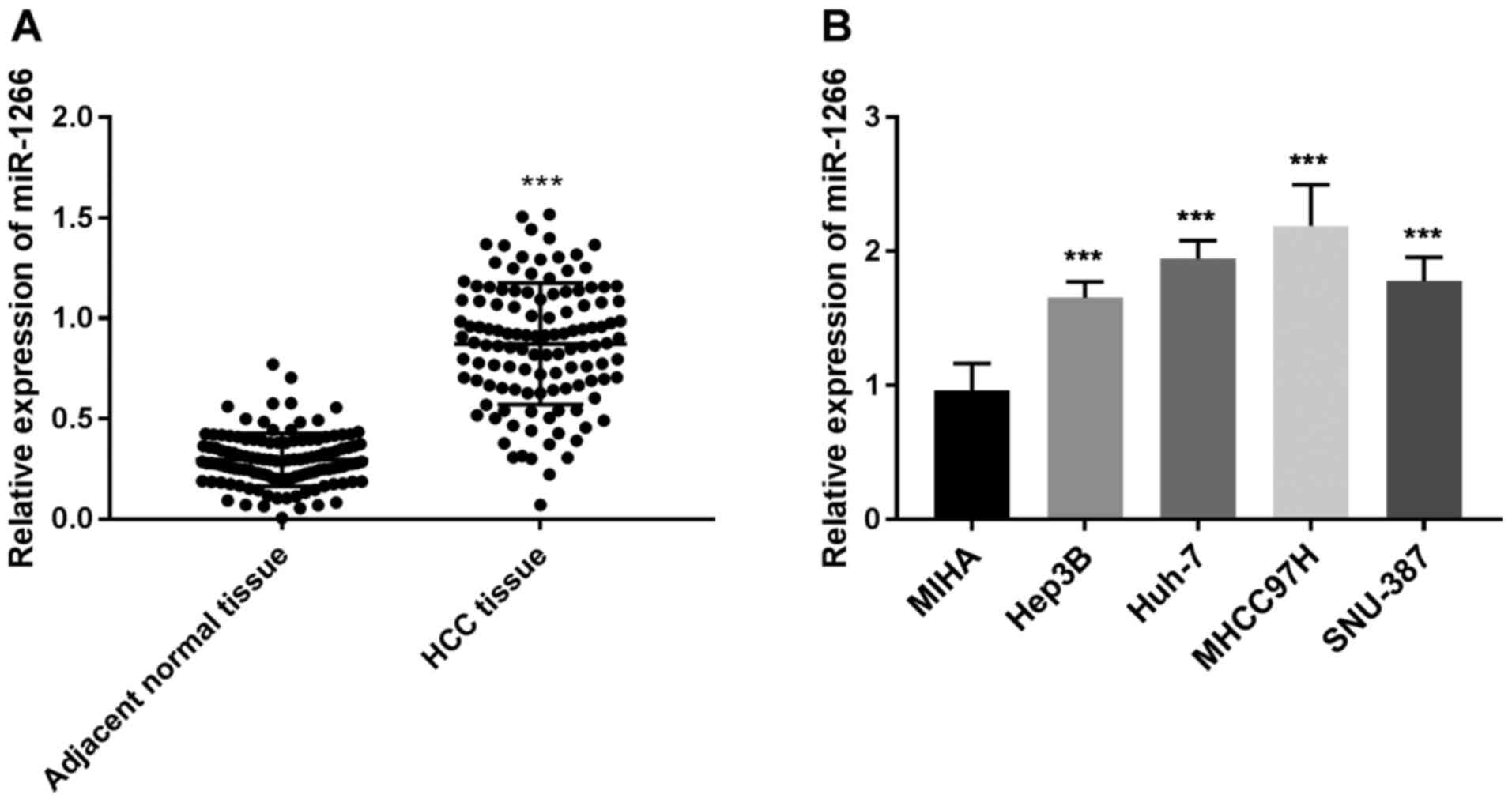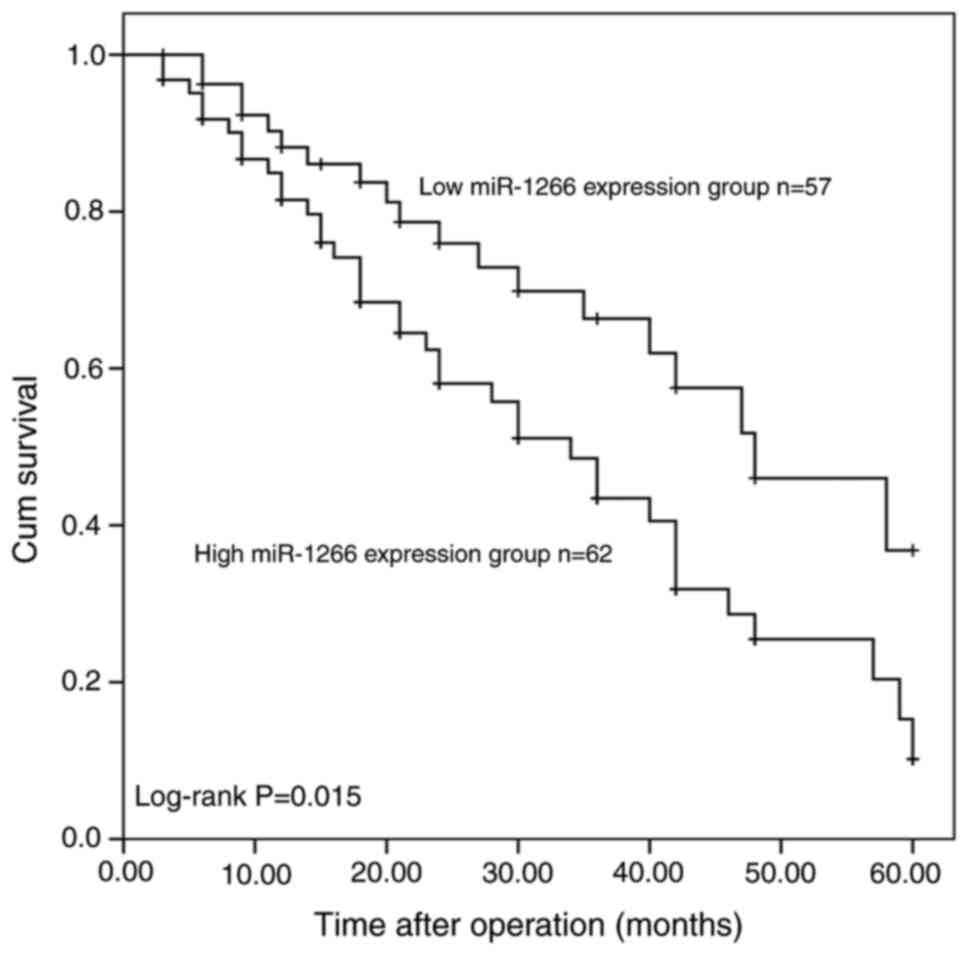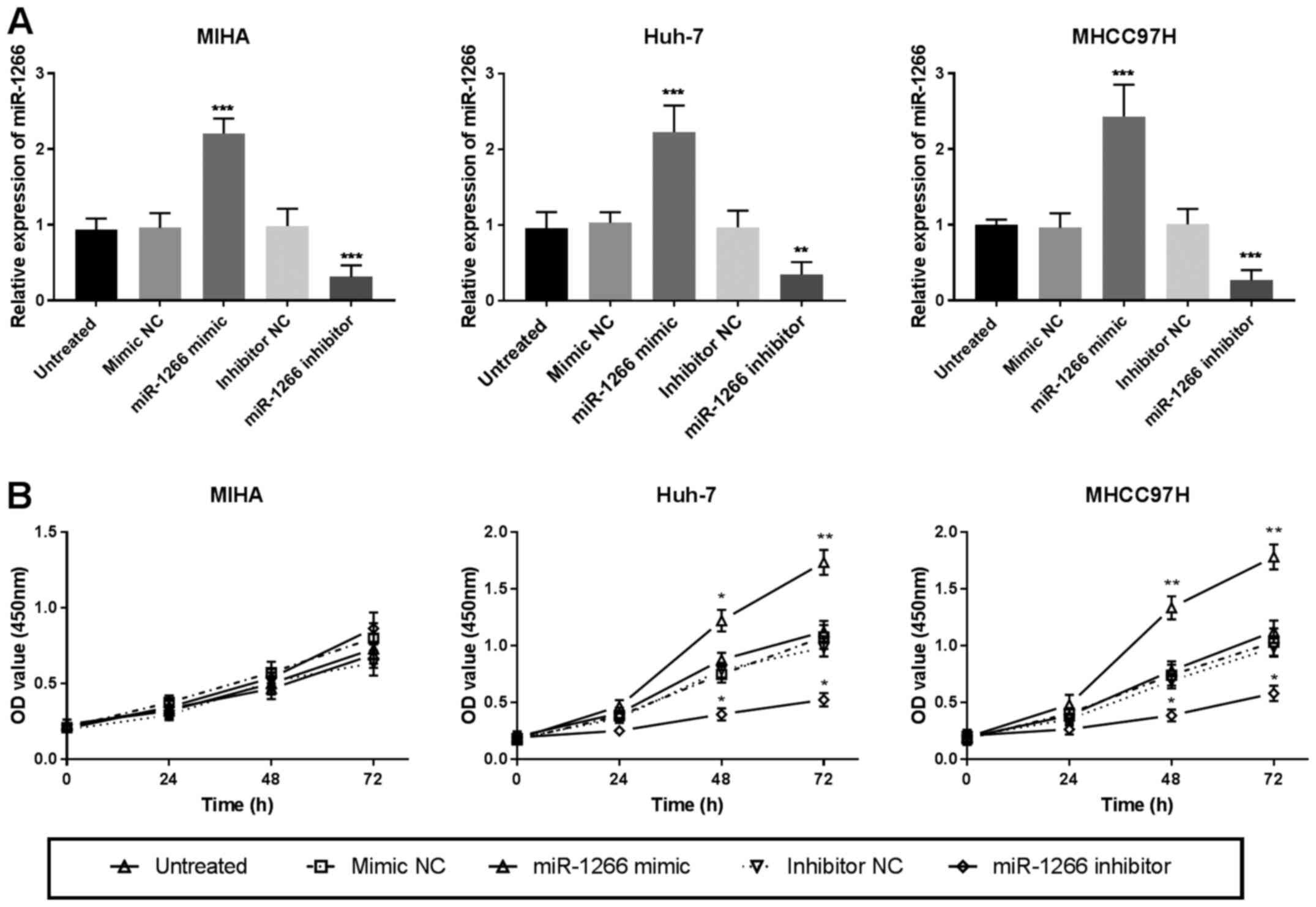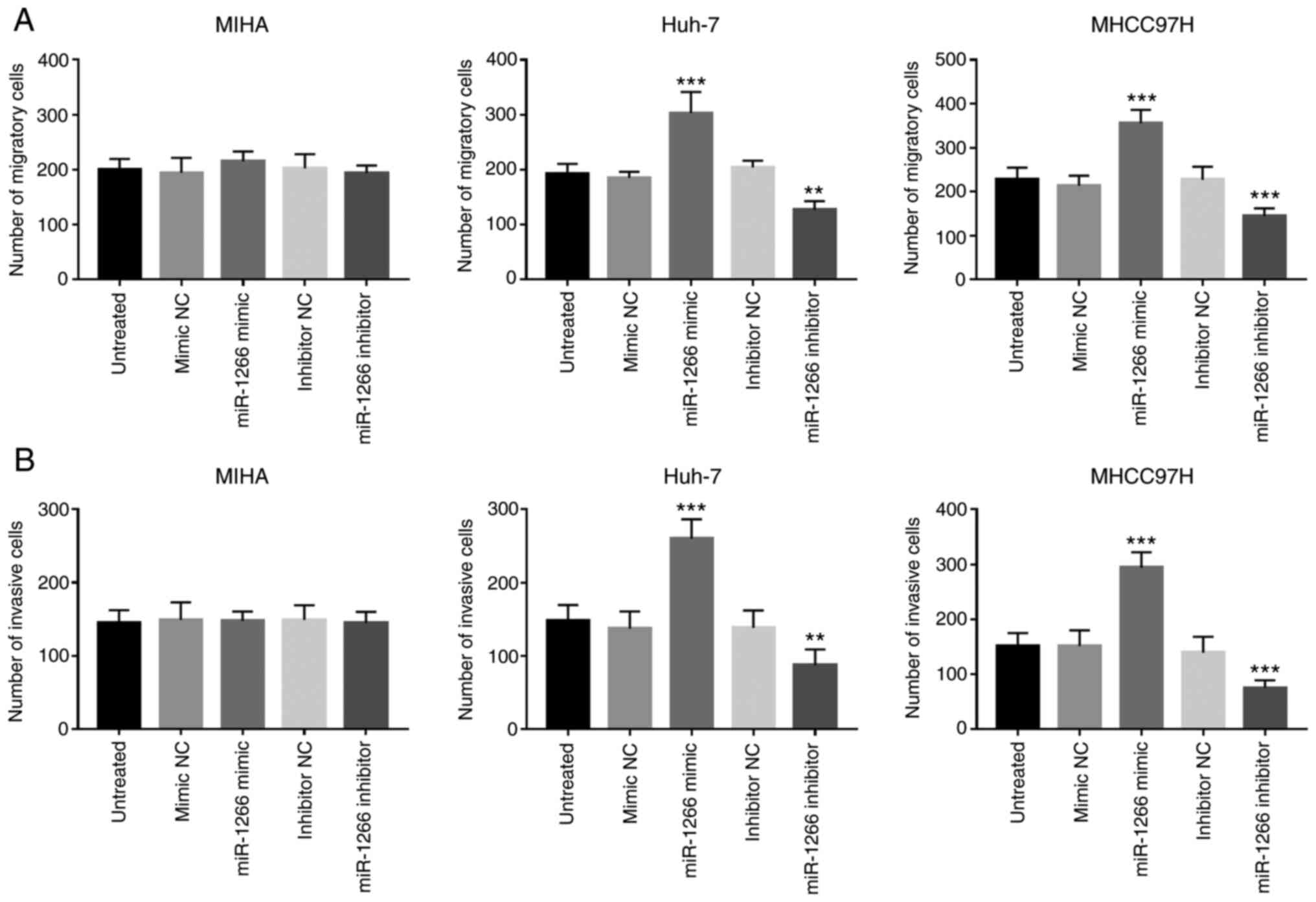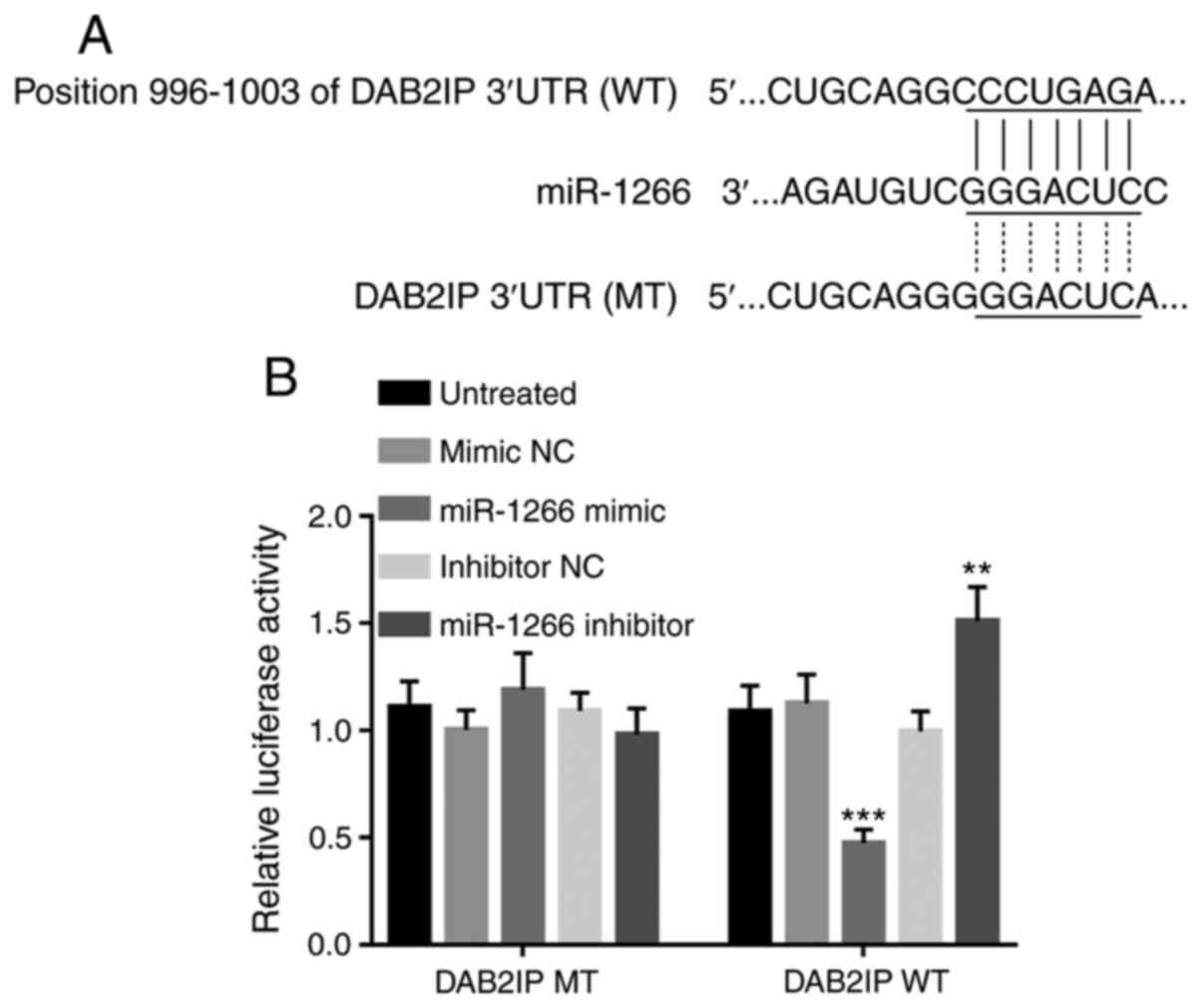|
1
|
Forner A, Llovet JM and Bruix J:
Hepatocellular carcinoma. Curr Opin Gastroenterol. 10:339–351.
2006.
|
|
2
|
Heinrich B, Czauderna C and Marquardt JU:
Immunotherapy of hepatocellular carcinoma. Oncol Res Treat.
41:292–297. 2018. View Article : Google Scholar : PubMed/NCBI
|
|
3
|
Etik DO, Suna N and Boyacioglu AS:
Management of hepatocellular carcinoma: Prevention, surveillance,
diagnosis, and staging. Exp Clin Transplant. 31–35. 2017.
|
|
4
|
Intaraprasong P, Siramolpiwat S and
Vilaichone RK: Advances in management of hepatocellular carcinoma.
Asian Pac J Cancer Prev. 17:3697–3703. 2016.PubMed/NCBI
|
|
5
|
Sherman M: Recurrence of hepatocellular
carcinoma. N Engl J Med. 359:2045–2047. 2008. View Article : Google Scholar : PubMed/NCBI
|
|
6
|
Poon RTP: Differentiating early and late
recurrences after resection of HCC in Cirrhotic Patients:
Implications on Surveillance, prevention, and treatment strategies.
Ann Surg Oncol. 16:792–794. 2009. View Article : Google Scholar : PubMed/NCBI
|
|
7
|
Cabrera R and Nelson DR: Review article:
The management of hepatocellular carcinoma. Aliment Pharmacol Ther.
31:461–476. 2010. View Article : Google Scholar : PubMed/NCBI
|
|
8
|
Forner A, Da Fonseca LG, Diaz-Gonzalez A,
Sanduzzi-Zamparelli M, Reig M and Bruix J: Controversies in the
management of hepatocellular carcinoma. JHEP Rep. 1:17–29. 2019.
View Article : Google Scholar : PubMed/NCBI
|
|
9
|
De Stefano F, Chacon E, Turcios L, Marti F
and Gedaly R: Novel biomarkers in hepatocellular carcinoma. Dig
Liver Dis. 50:1115–1123. 2018. View Article : Google Scholar : PubMed/NCBI
|
|
10
|
Awasthi R, Rathbone MJ, Hansbro PM, Bebawy
M and Dua K: Therapeutic prospects of microRNAs in cancer treatment
through nanotechnology. Drug Deliv Transl Res. 8:97–100. 2018.
View Article : Google Scholar : PubMed/NCBI
|
|
11
|
Mohr AM and Mott JL: Overview of microRNA
biology. Semin Liver Dis. 35:3–11. 2015. View Article : Google Scholar : PubMed/NCBI
|
|
12
|
Saliminejad K, Khorram Khorshid HR,
Soleymani Fard S and Ghaffari SH: An overview of microRNAs:
Biology, functions, therapeutics, and analysis methods. J Cell
Physiol. 234:5451–5465. 2019. View Article : Google Scholar : PubMed/NCBI
|
|
13
|
Vienberg S, Geiger J, Madsen S and
Dalgaard LT: MicroRNAs in metabolism. Acta Physiol (Oxf).
219:346–361. 2017. View Article : Google Scholar : PubMed/NCBI
|
|
14
|
Cai Z, Zhang F, Chen W, Zhang J and Li H:
miRNAs: A promising target in the chemoresistance of bladder
cancer. Onco Targets Ther. 12:11805–11816. 2019. View Article : Google Scholar : PubMed/NCBI
|
|
15
|
Aghdam SG, Ebrazeh M, Hemmatzadeh M,
Seyfizadeh N, Shabgah AG, Azizi G, Ebrahimi N, Babaie F and
Mohammadi H: The role of microRNAs in prostate cancer migration,
invasion, and metastasis. J Cell Physiol. 234:9927–9942. 2019.
View Article : Google Scholar : PubMed/NCBI
|
|
16
|
Schulte C, Karakas M and Zeller T:
microRNAs in cardiovascular disease-clinical application. Clin Chem
Lab Med. 55:687–704. 2017. View Article : Google Scholar : PubMed/NCBI
|
|
17
|
Li C, Xu B, Miu X, Deng Z, Liao H and Hao
L: Inhibition of miRNA-21 attenuates the proliferation and
metastasis of human osteosarcoma by upregulating PTEN. Exp Ther
Med. 15:1036–1040. 2018.PubMed/NCBI
|
|
18
|
Garofalo M, Di Leva G, Romano G, Nuovo G,
Suh SS, Ngankeu A, Taccioli C, Pichiorri F, Alder H, Secchiero P,
et al: miR-221&222 regulate TRAIL resistance and enhance
tumorigenicity through PTEN and TIMP3 downregulation. Cancer Cell.
16:498–509. 2009. View Article : Google Scholar : PubMed/NCBI
|
|
19
|
Kong G, Zhang J, Zhang S, Shan C, Ye L and
Zhang X: Upregulated microRNA-29a by Hepatitis B Virus X protein
enhances hepatoma cell migration by targeting PTEN in cell culture
model. PLoS One. 6:e195182011. View Article : Google Scholar : PubMed/NCBI
|
|
20
|
Meng F, Henson R, Wehbe-Janek H, Ghoshal
K, Jacob ST and Patel T: MicroRNA-21 regulates expression of the
PTEN tumor suppressor gene in human hepatocellular cancer.
Gastroenterology. 133:647–658. 2007. View Article : Google Scholar : PubMed/NCBI
|
|
21
|
Chen F, Li XF, Fu DS, Huang JG and Yang
SE: Clinical potential of miRNA-221 as a novel prognostic biomarker
for hepatocellular carcinoma. Cancer Biomark. 18:209–214. 2017.
View Article : Google Scholar : PubMed/NCBI
|
|
22
|
Shi B, Zhang X, Chao L, Zheng Y, Tan Y,
Wang L and Zhang W: Comprehensive analysis of key genes, microRNAs
and long non-coding RNAs in hepatocellular carcinoma. FEBS Open
Bio. 8:1424–1436. 2018. View Article : Google Scholar : PubMed/NCBI
|
|
23
|
Aden DP, Fogel A, Plotkin S, Damjanov I
and Knowles BB: Controlled synthesis of HBsAg in a differentiated
human liver carcinoma-derived cell line. Nature. 282:615–616. 1979.
View Article : Google Scholar : PubMed/NCBI
|
|
24
|
Nakabayashi H, Taketa K, Yamane T,
Miyazaki M, Miyano K and Sato J: Phenotypical stability of a human
hepatoma cell line, HuH-7, in long-term culture with chemically
defined medium. Gan. 75:151–158. 1984.PubMed/NCBI
|
|
25
|
Tian J, Tang ZY, Ye SL, Liu YK, Lin ZY,
Chen J and Xue Q: New human hepatocellular carcinoma (HCC) cell
line with highly metastatic potential (MHCC97) and its expressions
of the factors associated with metastasis. Br J Cancer. 81:814–821.
1999. View Article : Google Scholar : PubMed/NCBI
|
|
26
|
Park JG, Lee JH, Kang MS, Park KJ, Jeon
YM, Lee HJ, Kwon HS, Park HS, Yeo KS, Lee KU, et al:
Characterization of cell lines established from human
hepatocellular carcinoma. Int J Cancer. 62:276–282. 1995.
View Article : Google Scholar : PubMed/NCBI
|
|
27
|
Livak KJ and Schmittgen TD: Analysis of
relative gene expression data using real-time quantitative PCR and
the 2(-Delta Delta C(T)) method. Methods. 25:402–408. 2001.
View Article : Google Scholar : PubMed/NCBI
|
|
28
|
Cheng CH, Lee CF, Wu TH, Chan KM, Chou HS,
Wu TJ, Yu MC, Chen TC, Lee WC and Chen MF: Evaluation of the new
AJCC staging system for resectable hepatocellular carcinoma. World
J Surg Oncol. 9:1142011. View Article : Google Scholar : PubMed/NCBI
|
|
29
|
Zachau L, Zeckey C, Schlue J, Sander J,
Meyer-Heithuis C, Winkler M, Klempnauer J and Schrem H:
Haematogenous abdominal wall metastasis of differentiated,
alpha-fetoprotein-negative hepatocellular carcinoma after previous
antiandrogen therapy within a site of lipoma manifestation since
childhood. World J Surg Oncol. 10:982012. View Article : Google Scholar : PubMed/NCBI
|
|
30
|
Poon RT and Fan ST: Hepatectomy for
hepatocellular carcinoma: Patient selection and postoperative
outcome. Liver Transpl. 10 (2 Suppl 1):S39–S45. 2004. View Article : Google Scholar : PubMed/NCBI
|
|
31
|
Bray F, Ferlay J, Soerjomataram I, Siegel
RL, Torre LA and Jemal A: Global cancer statistics 2018: GLOBOCAN
estimates of incidence and mortality worldwide for 36 cancers in
185 countries. CA Cancer J Clin. 68:394–424. 2018. View Article : Google Scholar : PubMed/NCBI
|
|
32
|
Su CW, Lei HJ, Chau GY, Hung HH, Wu JC,
Hsia CY, Lui WY, Su YH, Wu CW and Lee SD: The effect of age on the
long-term prognosis of patients with hepatocellular carcinoma after
resection surgery: A propensity score matching analysis. Arch Surg.
147:137–144. 2012. View Article : Google Scholar : PubMed/NCBI
|
|
33
|
Xu RH, Wei W, Krawczyk M, Wang W, Luo H,
Flagg K, Yi S, Shi W, Quan Q, Li K, et al: Circulating tumour DNA
methylation markers for diagnosis and prognosis of hepatocellular
carcinoma. Nat Mater. 16:1155–1161. 2017. View Article : Google Scholar : PubMed/NCBI
|
|
34
|
Sohn W, Kim J, Kang SH, Yang SR, Cho JY,
Cho HC, Shim SG and Paik YH: Serum exosomal microRNAs as novel
biomarkers for hepatocellular carcinoma. Exp Mol Med. 47:e1842015.
View Article : Google Scholar : PubMed/NCBI
|
|
35
|
Ostadrahimi S, Fayaz S, Parvizhamidi M,
Abedi-Valugerdi M, Hassan M, Kadivar M, Teimoori-Toolabi L, Asgari
M, Shahrokh H, Abolhasani M, et al: Downregulation of miR-1266-5P,
miR-185-5P and miR-30c-2 in prostatic cancer tissue and cell lines.
Oncol Lett. 15:8157–8164. 2018.PubMed/NCBI
|
|
36
|
Cañueto J, Cardeñoso-Álvarez E,
García-Hernández JL, Galindo-Villardón P, Vicente-Galindo P,
Vicente-Villardón JL, Alonso-López D, De Las Rivas J, Valero J,
Moyano-Sanz E, et al: MicroRNA (miR)-203 and miR-205 expression
patterns identify subgroups of prognosis in cutaneous squamous cell
carcinoma. Br J Dermatol. 177:168–178. 2017. View Article : Google Scholar : PubMed/NCBI
|
|
37
|
Zhang Y, Zhao Y, Sun S, Liu Z, Zhang Y and
Jiao S: Overexpression of MicroRNA-221 is associated with poor
prognosis in non-small cell lung cancer patients. Tumour Biol.
37:10155–10160. 2016. View Article : Google Scholar : PubMed/NCBI
|
|
38
|
Galardi S, Mercatelli N, Giorda E,
Massalini S, Frajese GV, Ciafrè SA and Farace MG: miR-221 and
miR-222 expression affects the proliferation potential of human
prostate carcinoma cell lines by targeting p27Kip1. J Biol Chem.
282:23716–23724. 2007. View Article : Google Scholar : PubMed/NCBI
|
|
39
|
Xu S, Yi XM, Zhang ZY, Ge JP and Zhou WQ:
miR-129 predicts prognosis and inhibits cell growth in human
prostate carcinoma. Mol Med Rep. 14:5025–5032. 2016. View Article : Google Scholar : PubMed/NCBI
|
|
40
|
Wang YL, Chen CM, Wang XM and Wang L:
Effects of miR-339-5p on invasion and prognosis of hepatocellular
carcinoma. Clin Res Hepatol Gastroenterol. 40:51–56. 2016.
View Article : Google Scholar : PubMed/NCBI
|
|
41
|
Fu YT, Zheng HB, Zhang DQ, Zhou L and Sun
H: MicroRNA-1266 suppresses papillary thyroid carcinoma cell
metastasis and growth via targeting FGFR2. Eur Rev Med Pharmacol
Sci. 22:3430–3438. 2018.PubMed/NCBI
|
|
42
|
Sevinc ED, Egeli U, Cecener G, Tezcan G,
Tunca B, Gokgoz S, Tasdelen I, Tolunay S and Evrensel T:
Association of miR-1266 with recurrence/metastasis potential in
estrogen receptor positive breast cancer patients. Asian Pac J
Cancer Prev. 16:291–297. 2015. View Article : Google Scholar : PubMed/NCBI
|
|
43
|
Sun CM, Zhang GM, Qian HN, Cheng SJ, Wang
M, Liu M and Li D: MiR-1266 suppresses the growth and metastasis of
prostate cancer via targeting PRMT5. Eur Rev Med Pharmacol Sci.
23:6436–6444. 2019.PubMed/NCBI
|
|
44
|
Wang J, Liu Y, Wang X, Li J, Wei J, Wang
Y, Song W and Zhang Z: MiR-1266 promotes cell proliferation,
migration and invasion in cervical cancer by targeting DAB2IP.
Biochim Biophys Acta Mol Basis Dis. 1864:3623–3630. 2018.
View Article : Google Scholar : PubMed/NCBI
|
|
45
|
Tutar Y: miRNA and cancer; computational
and experimental approaches. Curr Pharm Biotechnol. 15:4292014.
View Article : Google Scholar : PubMed/NCBI
|
|
46
|
Zhang X, Ren D, Wu X, Lin X, Ye L, Lin C,
Wu S, Zhu J, Peng X and Song L: miR-1266 contributes to pancreatic
cancer progression and chemoresistance by the STAT3 and NF-κB
signaling pathways. Mol Ther Nucleic Acids. 11:142–158. 2018.
View Article : Google Scholar : PubMed/NCBI
|
|
47
|
Lu M, Kong X, Wang H, Huang G, Ye C and He
Z: A novel microRNAs expression signature for hepatocellular
carcinoma diagnosis and prognosis. Oncotarget. 8:8775–8784. 2017.
View Article : Google Scholar : PubMed/NCBI
|
|
48
|
Chen L, Lü MH, Zhang D, Hao NB, Fan YH, Wu
YY, Wang SM, Xie R, Fang DC, Zhang H, et al: miR-1207-5p and
miR-1266 suppress gastric cancer growth and invasion by targeting
telomerase reverse transcriptase. Cell Death Dis. 5:e10342014.
View Article : Google Scholar : PubMed/NCBI
|
|
49
|
Liu Z, Yu Y, Huang Z, Kong Y, Hu X, Xiao
W, Quan J and Fan X: CircRNA-5692 inhibits the progression of
hepatocellular carcinoma by sponging miR-328-5p to enhance DAB2IP
expression. Cell Death Dis. 10:9002019. View Article : Google Scholar : PubMed/NCBI
|
|
50
|
Chen S, Wang L, Yao B, Liu Q and Guo C:
miR-1307-3p promotes tumor growth and metastasis of hepatocellular
carcinoma by repressing DAB2 interacting protein. Biomed
Pharmacother. 117:1090552019. View Article : Google Scholar : PubMed/NCBI
|















